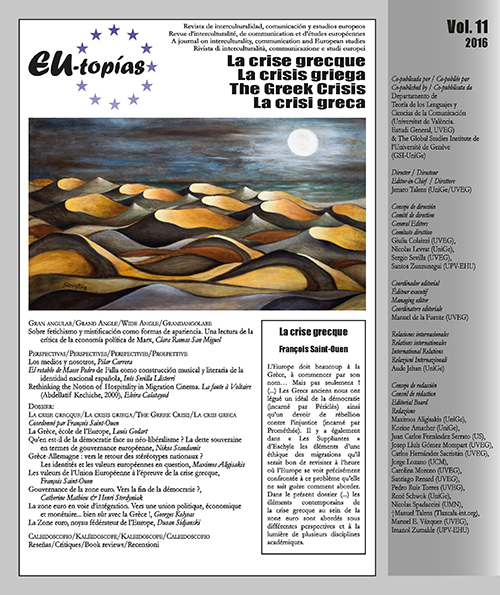Falla’s Master Peter’s Puppet Show as a musical and literary construction of the Spanish national identity
DOI:
https://doi.org/10.7203/eutopias.0.18670Keywords:
Falla, Cervantes, don Quixote, Spanish national identity, opera, interdisciplinar dialogue, transmedial topic Abstract
Abstract
The importance of Cervantes and Don Quixote as representative icons of a Spanish national identity developed and grew enormously during the XIXth and early XXth centuries, with the rise of nationalisms. The concept of intrahistoria as the cultural history of a people, its true history, guides various writings where regenerationist proposals are advanced, such as Unamuno’s Life of Don Quixote and Sancho or Ortega y Gasset’s Meditations on Quixote. I consider that, similarly, Falla’s Master Peter’s Puppets Show posits its own proposal for Spain through a dialogue between music and literature. Falla believes that Cervantes’ work (especially Don Quixote) encloses a magnificent representation of the eternal soul of Spain (in the words of the composer himself). Through the joint analysis of the libretto, the staging and the score, we can see the kind of reading that Falla is doing of Don Quixote and the kind of political discourse underlying that reading.
 Downloads
Downloads
 References
References
Azorín (1917), Páginas escogidas, Madrid, Calleja.
Azaustre, Antonio & Casas, Juan (2001), Manual de retórica española, Barcelona: Ariel.
Carta de Manuel de Falla a Adolfo de Salazar, Granada, 1924. Borrador manuscrito, Archivo Manuel de Falla, carpeta de correspondencia nº 7569.
Carta de Manuel de Falla a Juan José Mantecón. Granada, 22-XII-1932. Copia mecanografiada, Archivo
Manuel de Falla, carpeta de correspondencia nº 7235.
Casas, Álvaro de las (1940). Horas de España, Buenos Aires: Rueda.
Christoforidis, Michael (1997), Aspects of the Creative Process in Manuel de Falla’s El retablo de Maese Pedro and Concerto, Tesis doctoral, The University of Melbourne.
Close, Anthony (2004), «Las interpretaciones del “Quijote”», Francisco Rico (ed.), Don Quijote de la Mancha, Barcelona: Círculo de lectores-Galaxia Gutemberg, vol. 1, pp. CLX – CXCI.
— (2005), «La concepción romántica del Quijote», Gonzalo G. Djembé (ed.), Barcelona: Crítica.
Falla, Manuel de, Notas al programa, borrador manuscrito, ref. 9006-3, Archivo Manuel de Falla.
Fox, Inman (1997), La invención de España, Madrid: Cátedra.
Gallego, Antonio (1987), «Dulcinea en el prado (verde y florido)», Revista de Musicología, 10 (2), pp. 685-699.
Jean-Aubry, Georges (1923), «De Falla Talks of His New Work Based on a Don Quixote Theme», The Christian Science Monitor, Boston.
Monelle, Raymond (2000), The Sense of Music, Princeton: Princeton University Press.
— (2006), The Musical Topic, Bloomington: Indiana University Press.
Montero Reguera, José (1997), El Quijote y la crítica contemporánea, Alcalá de Henares: Centro de Estudios Cervantinos.
— (2005), El Quijote durante cuatro siglos. Lecturas y lectores, Valladolid: Universidad de Valladolid.
Roda, Cecilio de (1905), «Los instrumentos músicos y las danzas en el Quijote», El Ateneo de Madrid en el III centenario de la publicación de El ingenioso hidalgo don Quijote de la Mancha, Madrid: Imprenta de Bernardo Rodríguez, pp. 147-178.
— (1905), «Las canciones del Quijote», El Ateneo de Madrid en el III centenario de la publicación de El ingenioso hidalgo don Quijote de la Mancha, Madrid: Imprenta de Bernardo Rodríguez, pp. 455-466.
Romero Tobar, Leonardo (1989), «El Cervantes del siglo XIX», Anthropos. Revista de documentación científica de la cultura, 98-99, pp. 116-119.
Torres Clemente, Elena (2007), Las óperas de Manuel de Falla. De La vida breve a El retablo de maese Pedro, Madrid: Sociedad Española de Musicología.
Downloads
Published
How to Cite
-
Abstract274
-
PDF (Español)109
Issue
Section
License
![]()
The authors conserve the copyright. All content published in EU-topías. Journal of interculturality, Communication, and European Studies are subject to the license Creative Commons Attribution-NonCommercial-ShareAlike 4.0 license. The full text of the license can be found at <http://creativecommons.org/licenses/by-nc-sa/4.0>
They may be copied, used, disseminated, transmitted and publicly displayed, provided that:
- The authorship and original source of the publication is cited (journal, publisher and URL of the work).
- They are not used for commercial purposes.
- The existence and specifications of this license of use are mentioned.
It is the responsibility of the authors to obtain the necessary permissions for images that are subject to copyright.



